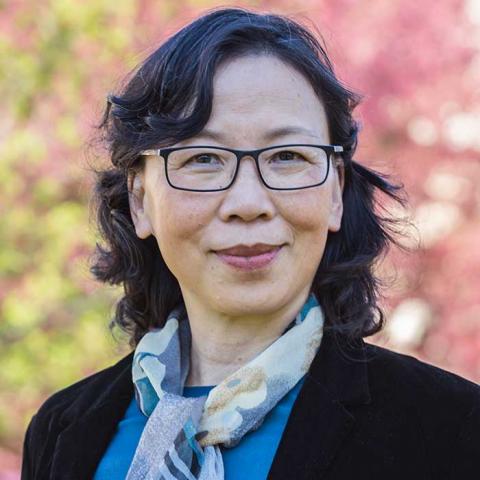Education
B.A. in English Language and Literature, Wuhan Teachers College (later renamed as Hubei University), Wuhan, China.
B.A. in Linguistics (Independent major), Bryn Mawr College.
M.A. and Ph.D. in Linguistics, University of Pennsylvania.
Biography
I worked at a tea plantation after graduating from high school in China, an experience not too different from that of millions of city youths who were sent down to the countryside to be re-educated by the peasants during the Cultural Revolution (1966-1976). I learned to do everything related to tea making, such as picking tea leaves, cutting and carrying loads of tea branches down the hill to make tea bricks favored by nomadic people, and pressing fresh tea leaves in hot woks to make the fine green tea. The off season for tea making was high season for rice production. So I also worked in rice paddies for planting and harvesting. I even experimented with some enterprising peasants to start an orange orchard although we didn't get very far with that initiative. I went to college when China resumed the national college entrance examination after a ten-year hiatus. My education took me all the way to Bryn Mawr College and then the University of Pennsylvania where I followed my passion in studying linguistic phenomena, particularly the underlying patterns, from a theoretical perspective. In 1989, I came to teach at Haverford College, where I have held the chair of C.V. Starr Professorship in Asian Studies since 2004. Prior to coming to Haverford, I taught for a number of years at Swarthmore College.
Research and Teaching
My research interests center on the syntax/semantics interface and comparative linguistics. Past work concentrated on some of the most fundamental relations in natural language such as quantification, modification, and coordination. I also worked on event semantics. Recent work has taken me further in applying some mathematical logical tools, such as the Skolem function, to provide a unified account of some seemingly unrelated phenomena. In my dissertation, which was later turned into a book, I argued that distributive universal quantification is a double-variable affair, namely the essence of distributive universal quantification is that for every x there is a y, not a single variable affair as represented in the standard predicate logic. Skolemization of universal quantifiers results in making the value of y depend on the value of x. I put this Double-Variable Hypothesis on distributive universal quantification on test through a joint project with two other linguists at the University of Pennsyvania during 2018-2019, where we designed semantic experiments with sentences involving every in what is known as Mad Magazine sentence types (tenseless sentences). It was encouraging that the pilot project yielded results consistent with my hypothesis. I am collaborating with two other linguists at UPenn now to expand the scope of the semantic experiments to test the Double-Variable Hypothesis on a larger scale, hopefully testing both English and Chinese.
My most recent research on the pairings of the sort (a) [mei A *(dou) B] 'every A dou B,' and (b) [lian A *(dou) B] 'even A dou B' in which the adverb dou is essentially required has revealed that the surface structures like (a) and (b) and quite a few others which are too numerous to list here are manifestations of a single mathematical structure called lattice. It certainly suggests itself as a mechanism in the I-language in the Chomskyan framework for Universal Grammar. It begs the following questions: How widespread is this particular mathematical structure in natural language? How does it interface with language specific constructions? How would it help us gain a deeper understanding of the cognitive computational system? These are some of the questions that I will pursue in the next phase of my research.
I share my passion for raising research questions with all students I teach, and I teach with passion in both theoretical linguistic courses such as Structure of Chinese, and Advanced Chinese language courses on multiple topics, including China's WWII, Musical concepts and practices in China, Food and Food Production, and The Cultural Revolution (1966-1976).
I publish under Shi-Zhe Huang, Shizhe Huang, or 黄师哲.
